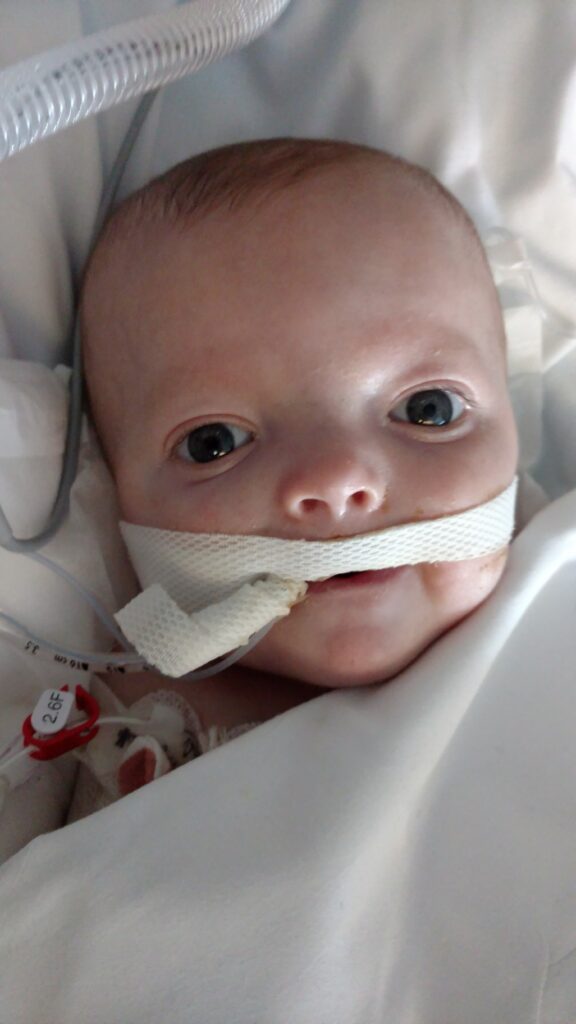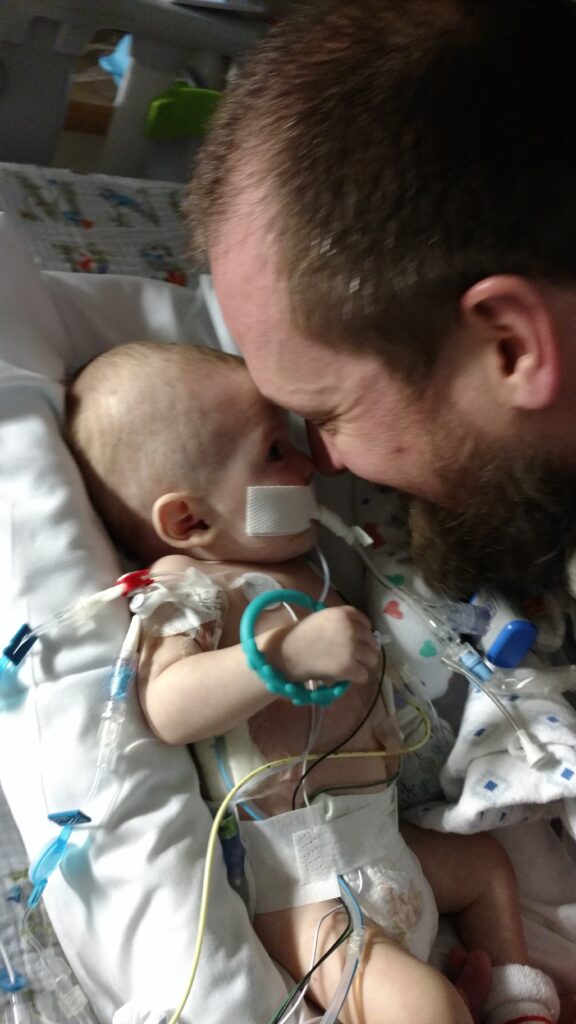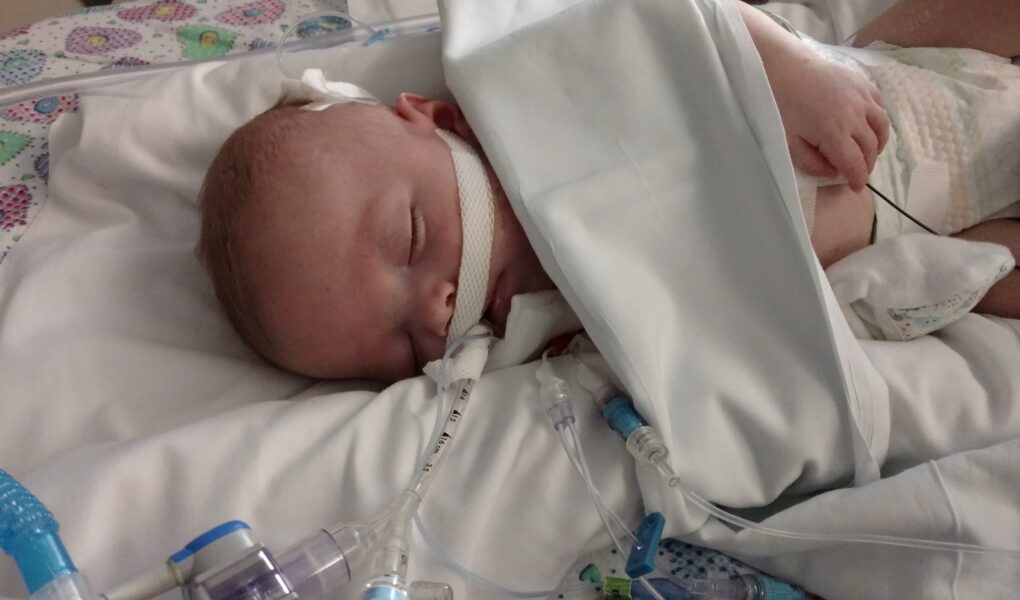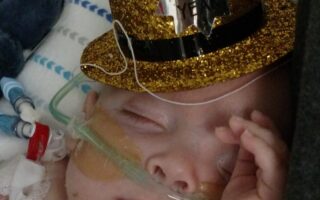The chest tube did immediately seem to provide some relief for Teddy thankfully. As soon as some of the fluid was drained from his chest, his breathing difficulties started to ease and he seemed to be less agitated and in pain. The doctors still did not know why his chest was filling with fluid, but they took some cultures of the fluid to send off to be tested. Additionally, while his breathing was better, they were still not able to wean him off of the breathing tube. This meant we were still unfortunately not able to hold him. It had been 3 weeks since we had been able to hold him and it was killing us to not just be able to pick him up and comfort him while he was struggling so much.
Teddy was still struggling and we didn’t know why, so we were both still on edge. We tried to smile and be positive, but every little thing seemed to cause panic in my head. Teddy’s central line (the IV that essentially goes directly to the heart), had failed and they had to remove it, so were relying on IVs. One significant issue that Teddy had struggled with since birth was that he had terrible veins. They were tiny and would blow pretty much immediately, which meant that they were always struggling to keep an IV functioning. This resulted in Teddy almost always having an IV in his head, since those were his biggest veins. By this point though, even those veins were being worn out and everyone was on eggshells every time they tested an IV to see if it still worked.
Remember how I said that I only remember 5 times that I truly lost it and had a breakdown while Teddy was in the hospital? Well one of those times was during the week while we were struggling to find out what was going on and they were struggling to have a functioning IV. A new sweet nursing assistant had come over to do her daily checks and tests. I had mentioned to her to be careful because his IV line in his head was dangling over the edge of the bed and she was moving the IV pole. I turned around to start setting up the breast pump and when I turned back around, I saw her pull the IV pole to the end of the bed and it ripped out the IV in his head and blood was shooting out everywhere. It was horrifying. It was all over him, the cabinets, the floor, and the nursing assistant. When I say I lost it, I am definitely not exaggerating. I screamed at her and immediately started bawling. I was crying uncontrollably, yelling, and everyone was in shock. Nurses came running from all directions to not only stop the bleeding, but also to get me to calm down. I was so mad, but mainly I was terrified that they would not be able to get a successful IV again. I honestly don’t remember Jason standing there when it happened, but I remember he was trying to calm me down as well, but I was sobbing for at least 10 minutes. I still remember a young mother sitting a few bays down, with this look of concern and shock on her face, but also with understanding and caring in her eyes. I was thankful for those caring eyes. Not surprisingly, the young nursing assistant immediately burst into tears and the head nurse took her out of the NICU. Once I calmed down, I felt horrible, because it was an accident. I went to find her and apologize, which she said she understood, but she was still so upset and I am sure she will remember that moment forever, just like I do.
Once they managed to get a new IV in, after multiple sticks with an ultrasound, they scheduled a CT to try and determine what was going on and finally got the results back on the cultures. They determined Teddy had a leak of his lymphatic system, also known as a chylothorax. I will do my best to explain what this means, but honestly, I still struggle to really explain it. According to the Cleveland Clinic, “The lymphatic system is a network of organs, vessels and tissues that move a colorless fluid called lymph back to your bloodstream. Lymph is a watery fluid that moves through your lymphatic system. Your lymphatic system helps support your overall health. Lymph collects fluids from your tissues and returns them to your blood. It carries nutrients and proteins to your cells and tissues.” Essentially, your body absorbs the nutrients and proteins from the foods you eat into the bloodstream, which then goes to the organs to help them function through the circulatory system. The plasma within the blood (the lymph), separates and seeps into the lymphatic system which pushes oxygen, nutrients and proteins into cells and tissues. The lymphatic system also removes “bad” cells, such as cancerous, bacteria, or viruses, and filters it through the lymph nodes. Once filtered, all the good lymph is then pushed back into the bloodstream for the process to start over again. Lymph production is increased with fats in the diet, so often if there is an issue with lymphatic production, a patient will need to go on a total non-fat diet or be placed on total parenteral nutrition (TPN) until the issue has been resolved. Leakage of chyle is associated with increased mortality due to significant loss of essential proteins, immunoglobulins, fat, vitamins, electrolytes, and water.
It would actually take us a few weeks to get the full picture of what was happening, but at the moment we found out, this is what they explained to us. They weren’t sure exactly how it happened, but they believed that either during the surgery, they accidentally nicked his lymphatic system. They believed it happened during the very extensive first surgery he had during Foker 1, but it did not show up, since he was still on TPN rather than breast milk. After they completed Foker 2 and confirmed his esophagus had no leaks, they removed his chest tube and started him back on breast milk. The fat in the breast milk caused an increase in lymph production, which caused the lymphatic leak to get worse. This resulted in the fluid build up in his chest, since he no longer had a chest tube. The fluid build up then caused his lung to collapse.
Once they confirmed the lymphatic leak, they immediately took him off of breast milk again and started him on TPN. The doctors were telling us that while this was a serious complication, these leaks will often repair themselves once the patient is on TPN, so we would just need to be patient and wait. Unfortunately, they said it could take weeks. As hard as that was to hear, there truly was nothing they could do, so we focused on the fact that things would be better soon. Teddy definitely seemed to feel better with the chest tube and being on TPN, so we felt some comfort in that. It was two days before Christmas, so we began to focus on trying to make Christmas a day of happiness, rather than worry.





